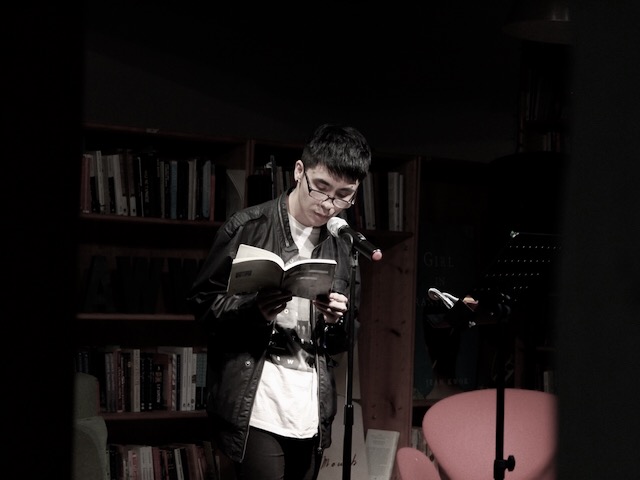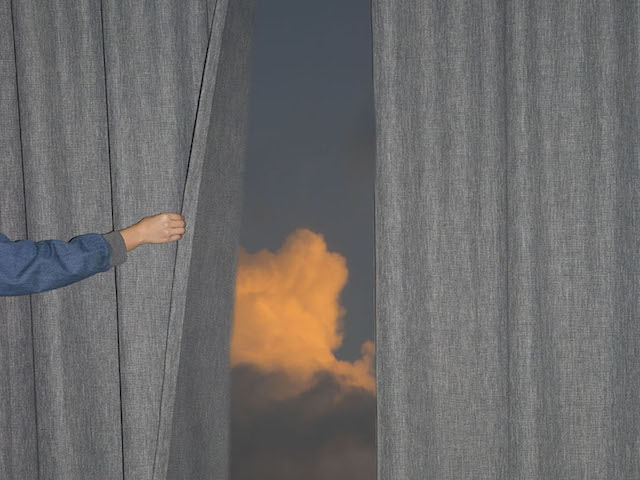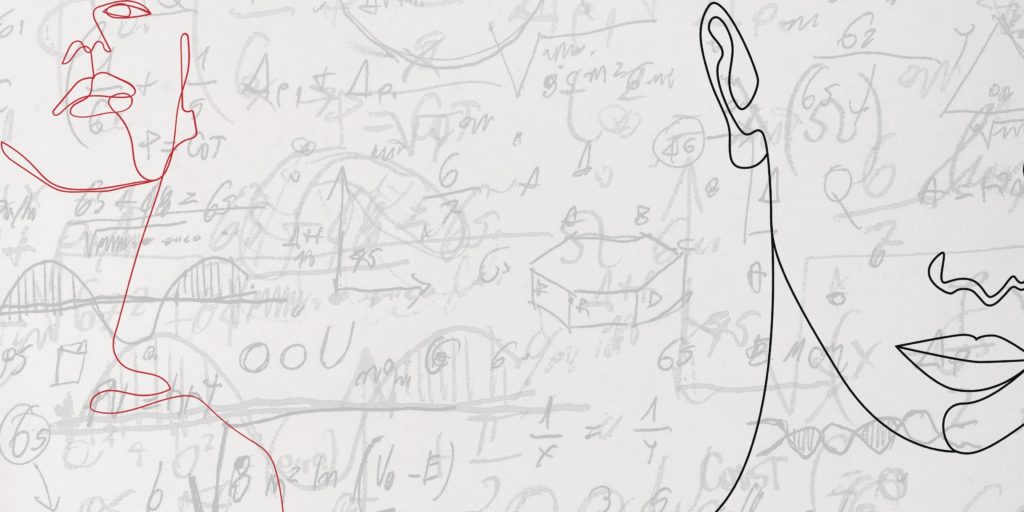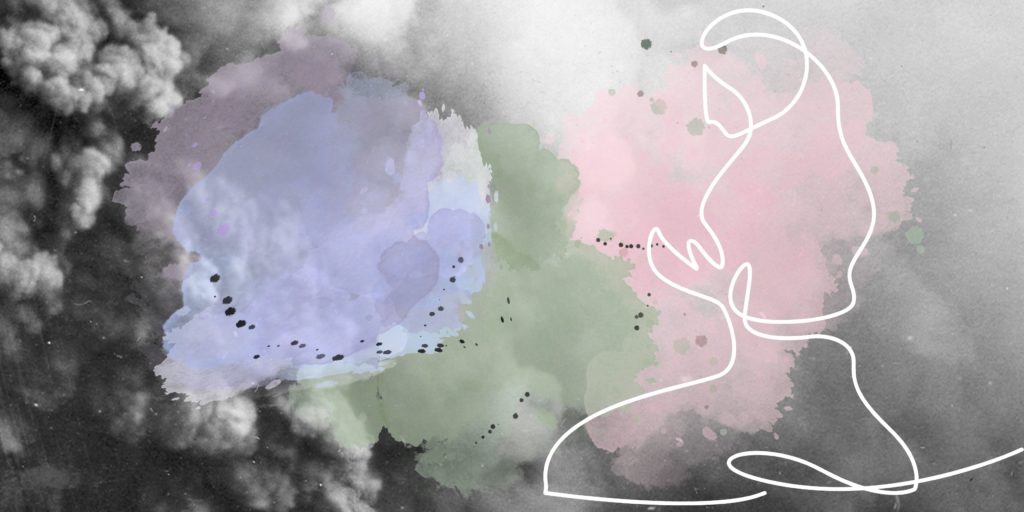What a review of Ocean Vuong’s Night Sky with Exit Wounds tells us about critics’ narrow perceptions of immigrant and war-affected identities

July 5, 2018
In the June 2018 edition of The New Criterion I came across an omnibus poetry review titled “Old Wounds” in which the critic and poet William Logan wrote this of Ocean Vuong’s first book of poems, Night Sky with Exit Wounds:
Little in Vuong’s work conveys the immigrant’s wrenching dislocation or permanent sense of loss, the rupture of identity between two worlds and the knowledge of being orphaned in both. Whatever private terrors lie within the poems, we get only the PG version, with X-rated snippets here and there. The poet was eleven before he learned to read, but this has more standing in his publicity than in poetry. The emotion that seethes beneath, a rage more unnerving for largely being repressed, is far more articulate than anything he brings himself to admit.
Too often the underlying matter—the disrupted family, the sexual noir—overwhelms the poor verse. The U.K. jacket prose calls the poet “steeped in war”; but it’s unclear how steeped he can be, born a dozen years after the war was over. (Growing up in Hartford, he didn’t visit Vietnam until his twenties.) That doesn’t diminish the despair of watching your family struggle in a new world; but the rougher memories exist only as spectral narratives—his father apparently spent time in prison, but where and why are never revealed.
Reading these paragraphs a first, a second, and then a third time over, I found myself growing more irritated. I was angry not because I disagreed with all of Logan’s points: I liked Vuong’s collection fine, but like Logan I found that the poems at times can veer towards the precious, that the sensual and emotional logic of Vuong’s metaphors might crumble whenever critical pressure is applied. My anger surrounds the paragraphs above, along with the following statement that Logan makes:
Confessional poetry began shading into identity politics a decade or so ago, when the fraught psychology of [Sylvia] Plath and [Robert] Lowell became less important than the still-raw oppressions of biography; but biography has now become the whole sales-pitch… The poet’s back story, as Hollywood would call it, is so affecting it gets in the way.
Leaving aside Logan’s take on Confessional poetry for the moment, we are to understand that apparently the only reason we are reading Vuong with enthusiasm at all is because of his racial and historical identity as a post-1975 Vietnamese refugee to the United States.
My initial impulse was to defend Vuong’s poems against Logan’s review by re-examining the poems Logan criticizes because, though I had quibbles with Night Sky with Exit Wounds, clearly I enjoyed the collection in more ways than Logan. But as I did this, it became clear that Logan’s recitation of Vuong’s biography, Logan’s vision of Vuong himself, finally, overwhelmed his reading of Vuong’s poetry: in many ways, Logan’s fascination with Vuong’s “backstory” made Vuong’s poetry irrelevant. Logan instead created what might better be described as the specter of Vuong to raise larger questions about how we do, or should, read racial and historical identities in poems; what we imagine, or don’t know, about Vietnamese Americans; how we should write, or not write, about war; who should, or should not, write about war; and finally, how long we imagine wars to last in our cultural memories. The more I returned to Logan’s review, in fact, the more Logan’s review became obviously less about Night Sky at all than about reifying the misperceptions (perhaps both ill- and well-intended) that we have held about Asian American writers for the past several decades. In that sense, sadly, Vuong ceased to be Vuong in both Logan’s review and my response but, instead, is a stand-in for a myriad of other writers of Asian descent who are scrutinized by institutions that Logan’s review epitomizes. And in that sense, too, Logan ceased to exist and instead becomes emblematic of a larger critical architecture around race and writing that I have, over years, become depressingly familiar with. To respond to Logan’s essay truly on Logan’s terms requires not that I defend Vuong, nor even attack Logan. It requires that I engage with the ideas that Vuong represents to Logan, which have larger consequences for all writers of color, and implicates far more reviewers than Logan.
Logan’s most repeated point is that Vuong’s poetry fails to induce feelings of pain appropriate to what Logan imagines about Vuong’s history. A refugee, a descendant of war, a fatherless man living between two nations, surely his poems should indulge in the “rougher memories” that must comprise his actual life. Perhaps it’s better to say that Vuong does not articulate this pain in a way that Logan recognizes, since Logan also argues that Vuong’s response to war’s effects on his family are not affectively horrifying enough: “the debt incurred,” he writes of Vuong’s poetry, “should demand something like Heart of Darkness.” Heart of Darkness is an illuminating choice of texts, as Heart of Darkness was the basis for Apocalypse Now, Coppola’s much-lauded film about the Vietnam War that focused on the moral crimes and physical suffering of American soldiers at the visual expense of the Vietnamese and Cambodians, who are portrayed—to an individual—as voiceless, primitive savages. In that, Apocalypse Now is most true to Heart of Darkness, which similarly trains its gaze on the horrific acts committed by European imperialists while simultaneously trying to rescue the standing of Europeans by taking seriously their moral flaws, indications—apparently—of whiteness’ psychological complexity. All the while, the voiceless Congolese are summarily slaughtered. Logan, if he’d read Viet Thanh Nguyen’s novel The Sympathizer and its artful skewering of both Coppola’s film and, by implication, Conrad’s text, might realize some Vietnamese and Asian American artists would find that particular novel, recalling as it does that particular film, a dubious aesthetic standard to attain.
The invocation of Heart of Darkness might have another, less intended effect, which is to remind readers that most of the artistic representations of war, and especially the Vietnam War, that Americans are exposed to have been constructed around Western and American veterans’ experiences, and the vast majority of these have been also filtered through white-helmed Hollywood and television studios. If Vuong’s poems seem too “soft focus” for Logan, too devoid of the “rougher memories,” perhaps that is because Logan isn’t seeing what (and who) he’s been trained to see about this war.
Logan’s desire for Vuong’s poems to emotionally approximate white representations of Western imperialism is dangerous territory, and strange considering that Logan seems blasé about the more explicitly odd and psychologically horrifying details about war that Vuong does present. War, in Vuong’s poetry, is not only traumatic and violent, it is also the event that makes Vuong’s existence possible, as he writes in his poem “Notebook Fragments”:
An American soldier fucked a Vietnamese farmgirl. Thus my mother exists. Thus I exist. Thus no bombs = no family = no me.
War, identity, the joy of being alive and the pain of historical and personal loss are thus inextricably bound for Vuong as poet and narrator. War is not only grotesque violence; war is also life.
Likewise, Logan seems to skate over certain aspects of Vuong’s identity, to confuse them or (most confusingly) downplay them even as he insists on their importance. Early in the review Logan notes that Vuong arrived in the United States as a two-year old refugee; later he says that “[l]ittle in Vuong’s work convey the immigrant’s wrenching sense of loss” (italics mine). The difference between refugee and immigrant identities, here elided, is historically and culturally enormous to Asian communities, as refugees struggle far more than immigrants with long-term negative impacts on their educational and economic opportunities, their cultural assimilation, and their physical and mental health, much of this due to the fact that refugees did not, in general, willingly choose to leave their own country of origin. Logan’s review acknowledges Vuong’s “back story” must contain some of the difficulties around assimilation and migration that I mention here. But his review also focuses on the absence of what he imagines to be the (always negative) cultural bifurcation that should attend Vuong’s identity, while at the same time suggesting that this cultural bifurcation itself might be a self-imposed fiction: Logan pointedly mentions that Vuong—two years-old at his time of arrival to the States—essentially grew up in Connecticut.
Throughout Vuong’s poems, Logan writes, “emotion… seethes beneath, a rage more unnerving for largely being repressed.” This rage seems to refer both to the lingering effects of war and perhaps how Vuong’s parents struggled in America. Having acknowledged the presence of this rage, however, I’m surprised that Logan does not spend more time actually analyzing the examples of suppressed male rage that occur in Vuong’s poems which, to me at least, seem obviously related both to the refugee experience and to war. If rougher memories are what Logan wants, here are some from “A Little Closer to the Edge:”
Young enough to believe nothing
will change them, they step, hand-in-hand,into the bomb crater. The night full
of black teeth. His faux Rolex, weeksfrom shattering against her cheek, now dims
like a miniature moon behind her hair.
Logan doesn’t connect these images to the stories he claims he wants to hear—stories about Vuong’s assimilation in America and his memories around the Vietnam War—possibly because he doesn’t see domestic violence as the terrifying continuation of war. Logan would likely criticize these lines, as he criticized others, as being too full of “romantic twaddle.” The images, even as they are violent, are also beautiful. That, to me, is Vuong’s point: beauty exists alongside brutality. The aesthetic pleasures we take in the moon, a woman’s cheek, the joy of physical touch cannot ultimately be separated from the horror we feel having witnessed a man beat a woman. As with Vuong’s poem “Notebook Fragments,” violent spectacle shades into the sensual, which both problematizes the aesthetic pleasures we might take in the world while also, unsettlingly, allowing us to imagine perpetrators of violence as compelling, perhaps even redeemable presences. This is something I find more disorienting, and more settling, than if the poems had been simply graphic.
Logan seems both annoyed by the amount of biographical detail he has to take into consideration to review Vuong’s collection, as well as dismayed by the biographical details he can’t find. His father spent time in prison, Logan notes, but where and why? Searching on the internet, I never found out the answers to Logan’s questions, but I did find one good reason why Vuong might have kept those details from his poems: his family history is complicated. Not only would that information bog down the poems, but I also doubt Vuong is interested in explaining himself for an audience less familiar with the intricate histories of the Vietnamese diaspora. About the success of this strategy Logan and I can agree to disagree: as an Asian American reader, I find Vuong’s desire not to explain refreshing; as someone from outside that community, Logan can legitimately find it oblique. Clearly Logan has intuited at least some of the biographical issues at stake, since he admits that, as a reader, he feels Vuong’s—or someone’s—rage at work. It is the lack of explicit material and emotion, it seems, that most exercises Logan, even as he himself admits to feeling the emotion working under the poems’ surface.
How much racial identity is enough? How much is too much? At times, Logan seems frustrated that Vuong has an identity at all: “The poet’s back story, as Hollywood would call it, is so affecting it gets in the way,” he complains. And yet, at every opportunity to see something other than Vuong’s identity, Logan resists, returning to his essential criticism that the self or selves Vuong has presented us with aren’t satisfying. One of the strangest (and contradictory) points he makes, to my mind, after his comment that Vuong doesn’t write more clearly about his “private terrors,” is that Vuong has no claim to first-hand war experience based on his age, so that “it’s unclear how steeped” in war he can be. This raises some fascinating questions about where authentic authorship of any war poem imaginatively ends. Is it only with those who fought? In that case, warrior-poets such as Owen, Sassoon, Hecht, Jarrell, Weigl, Turner, Lack, etc., are fine. But Yeats, who wrote about violent conflict but spent not one moment in the trenches? Komunyakaa? Sure. But Denise Levertov or Robert Hayden, who wrote virulently anti-Vietnam protest poems and never stepped foot in Vietnam? And what of the children of combat veterans, or their spouses? What of raped women, and men, what of the war journalists embedded with the combat units? Who among us has the right to write poems about war? I suspect Logan would say all of us, on the condition that we write well about war, even as his definition of writing well implied in this review clearly depends on one’s personal and historical proximity to combat itself.
As Logan’s review simultaneously both clings to and denies the power of Vuong’s identity, it begins to mimic, for me, the same seesawing ways we are taught to think and talk about identity in the culture at large, particularly when it comes to race and gender, even more particularly when those identities are attached to histories that make us uncomfortable. We are fascinated by those who have unique personal histories, but we also criticize them when those same histories don’t make us feel how we want to feel, thus challenging whether we can label the identity before us “authentic” enough, as if authenticity itself doesn’t become a performance orchestrated by the culture at large for particular communities to absorb and mimic.
I get what Logan is essentially arguing, of course: Vuong’s personal history draws critics and readers alike because they are hungry for novelty. Vuong’s age and identity make him refreshingly new, perhaps even “exotic” for a certain readership: in that case, Vuong’s identity absolutely matters. Logan is well within reason to be suspicious of the media’s fixation around the new (who among us, frankly, isn’t?), but to use that “novel” racial identity then as the primary or even a significant method of critiquing the poems means that in Logan’s eyes, Vuong can aesthetically “succeed” only if his poems either perform a preconceived notion of what an Asian American identity consists of, or if his poems fall within a formal project that we comfortably recognize. In either case, Vuong doesn’t get to succeed merely as Vuong: Vuong must authenticate himself as a “good” poet according to a burlesque of the identities and poetries he must always drag behind him.
Even when we take seriously the achievements of writers of color, when we praise the poems for being connected to one’s life, there are negative consequences. At times, this conflation between the identity of the poet and the poem they produce may make us more likely to take seriously the emotions or aesthetics certain poets risk, especially when the experience they articulate is seen to be unique or painful, and written in a style or in a form we imagine to be specific to their vision of that experience. At the same time, however, this conflation between poet and poem may narrow any future formal innovation for other poets with similar “backstories” who engage with the same subjects. The result, I think, is a simultaneous and paradoxical widening and narrowing of poetry for writers of color, as the wide critical acceptance of certain poets and poetries first culturally crystallizes then finally stultifies our reading of similar subject matters and identities: we know what the immigrant experience poem is because, according to Logan, we have read (and apparently disliked) Li-Young Lee. We know the narrative of war because we have read our Homer and then our Conrad and then our Hecht.
And yet how awful to imagine, to be forced to imagine, that some level of performing an identity at all still matters for the writer of color. How depressing to remember that there are critics who believe they can validate or critique writing based solely on whether that work reflects the lives of people we haven’t heard from before. How frustrating to find yourself defending work by presenting your own reading of that writer’s identity, in part to point out the problems with that critical architecture, in part because you recognize that the review of this identity damages a community of which you are also a part.
The best thing to do, of course, is to deny the very terms critics would use to determine what constitutes “bad” identity writing, and bad racial identities in general. Logan’s review makes this compelling to do, if not easy. Logan’s judgment that Vuong’s work is entirely and finally “bad” is not only flawed at times but logically convoluted. To address him point for point in this essay has forced me to engage with this review in a multi-pronged attack that also makes me feel slightly insane. I know that I am fighting what should be very different battles: the fight about whether Night Sky is good, the fight about poetic innovation as it attaches itself to racial identity, and the fight about what might constitute valid identities in poetry that explores both race and war. But I have to fight these battles simultaneously because Logan’s review collapses them and, by doing so, extends that critical tendency to negatively conflate the poet’s identity with the poems: whether Vuong’s work is good is also intricately wrapped up in how Logan reads Vuong. Can’t we separate out our ideas of good writing from how we imagine our identities must be performed? Logan’s review would baldly trumpet that we can even as it also implies that we shouldn’t. And what would be a “good” performance of identity for someone like Vuong exactly? Is he the successful migrant who—because he has lived so long in the States and so far apart from Vietnam and that messy war—might finally accept his cultural assimilation? Or should he be the opposite: psychically disrupted by his cultural and historical bifurcation, dislocated everywhere, at home nowhere? Should he never be writing about war, or should he be writing more and graphically about war? According to the tone of Logan’s review, Vuong had only two possible settings: traumatized refugee or assimilated immigrant, and he has failed at both. Anything that falls into the blurry middle, falls outside of these two altogether, or combines these categories into defiantly unsettling ways, is too “soft” to register.
Perhaps because of their intense subject matter, war poems, and poems written in the shadow of war, most depend on the reader believing that the author’s personal experience is intimately connected with the art that author produces: at some level, the poems must be recognized as legitimate and also immediate products of the war described. But when Logan suggests that Vuong cannot truly be “steeped” in the Vietnam War because he was born twelve years after it ended, he leaves aside the fact that wars rarely have cultural end dates that align with their political ones. I spent three years studying the medical and cultural effects of wartime trauma on Southeast Asian communities in America, as well as reading the work of second and third-generation Vietnamese refugees of war, to write The Broken Country, a book-length essay on intergenerational trauma and war. Logan’s piece suggests that twelve years is enough time for war to have worked its way through Vuong’s system. But what I learned is, twelve years is hardly enough.
The memory of war doesn’t fade with time but returns in newly horrifying and always distinct ways: the suicide of a sibling, perhaps, or drug use, or schizophrenia, or the physical abuse of a child or parent. This reality is bolstered by decades of mental health data collected by health care professionals across North America and Europe, and it’s been elucidated in much of the literature written by Southeast Asian poets and prose writers and graphic novelists. Most recently, in books by Cathy Linh Che and Diana Khoi Nguyen and Thi Bui and, yes, Ocean Vuong, memories of war filter down through the violent acts of parents, through sexual abuse and obsession, through whispered stories of terror and survival, through mental illness and depression. Logan mentions that Vuong’s work is descended from the Confessionals, and I think that’s right, but not for the reason Logan gives. The Confessionals, in part, used both outsized poetic personas and domestic settings in their poems to stage and investigate the hidden life of American Cold War nuclear families. Incest, adultery, mental illness, drugs and alcohol: all was laid bare on the page in order to challenge conservative notions about what it meant to be a “normal” American man or woman. In the poems of so many younger Vietnamese American writers, we can see that this same domestic setting becomes the stage for larger examinations around war, trauma, and remembrance: American foreign policy, in these writers’ works, becomes Asian American domestic reality. The past continues into the present, war mutates and spreads through communities, but it never completely disappears.
A different critic than Logan might note the fragmentary nature of memory in Vuong’s work, the elisions of fact and the shadowy nature of violence, and how these might not be so “PG” to a second-generation survivor of war, but formally mimetic to her own experience of war’s inherited trauma. Are these stylistic traits and images not “rough” enough for Logan? Are they not perceivable, and true?
If we assume the poem of war we can take seriously must be written in war’s immediate shadow, that would limit war’s actual scope, which echoes down the ages, changing and growing in each generation’s consciousness. Logan’s inability, or refusal, to acknowledge the formal and narrative presence of such “rougher memories” in Vuong’s poetry is the thing I find the most insidious, as it implicitly bolsters another conservative argument: that our wars have limited consequences, and if we can somehow overlook or dismiss the pain of people still reeling from war’s corrosive effects, even as we claim we want to feel it, then those wars themselves are put further behind us, we can forget, and thus render those who continue to suffer yet more invisible.
In the end, whether Vuong’s poems are aesthetically good or not according to Logan’s review is almost beside the point: these poems have become an opportunity for Logan to simultaneously both fetishize and discount the effects of war on Vuong and his family. I don’t buy for a minute that Logan actually wants to feel more from Vuong’s work, that he’s hungry to get a closer look at that suppressed rage. What was that anger meant to do for Logan, or us, anyway? Confirm our belief that protesting the Vietnam War was, finally, correct? Make Vuong the spectacle of our cultural voyeurism? What kind of rage can someone express if this anger has been predetermined as both unearned and too boringly personal? Finally, what if Vuong’s “soft focus” is the effect of placing writers of color into such specific and contradictory boxes? Be angry, but not too angry. Be conflicted, but not too conflicted. Be American, but admit you’ll never be at home here. What choice but to pull the camera back and back, trying to take the whole unfolding picture in? Is that what Logan means by “soft focus”? And is this expansive view of identity finally and only “soft”? Or is it just blurry for readers like Logan, who press their eyes to the narrowing lens, who claim to see it all, but still refuse to look.



